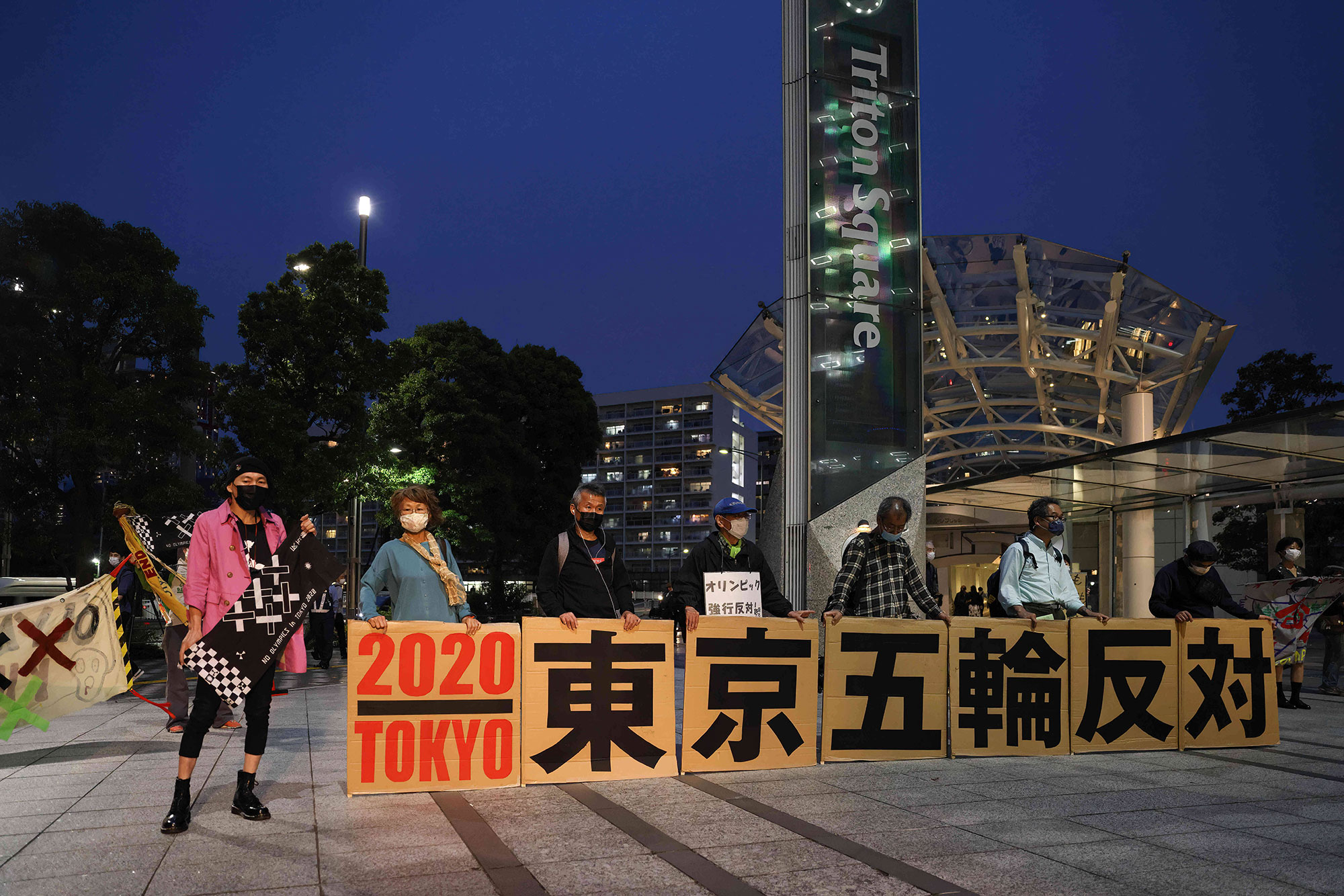It is the second time Olympic Games are held in Tokyo. While 1964 was crowned with success, this year’s Olympics are facing multiple challenges: travel restrictions, a slow Japanese vaccination program and declining public support. Recently, the usually rather reticent Japanese public even went as far as to take to the streets to protest against the holding of Olympics amidst a global pandemic.
By Andreas Ritzer 21.06.2021
As the day the Olympic flame is lit in Tokyo approaches, news about opposition to the 2021 Olympic Games comes in daily. People in Tokyo take to the streets and protest against the Games being held amidst a global pandemic.
Earlier this year, sexist remarks of ex-Olympics Chief Mori Yoshirō led to a public outcry against chauvinist structures in the Japanese society and finally to his dismissal. Arguably, the scandal had more far-reaching effects on the feminist debate in Japan than the Me Too Movement. As a result, the organization committee was taken over by a female president, the Olympics Minister and former athlete Hashimoto Seiko.
Recently, however, COVID-19 is at the root of public outrage over the Olympics. Ten thousand volunteers have already quit. Host towns are facing exploding additional costs due to COVID-19. Overseas teams are canceling their training camps in Japan over safety concerns. Recently, the Japanese medical organization requested the authorities to arrange a cancellation in an open letter to the Suga government.
As of 15 June, the Japanese Health Ministry counts 1,418 new daily cases, with the Tokyo Metropolitan Area being among the hardest-hit regions of the island state. As Asahi Shimbun surveys show, the Japanese are dissatisfied with their government’s response to the crisis. Particularly the vaccine program has been criticized as one of the slowest among developed countries. However, the Japanese Olympic Committee President declared that 95 percent of the Japanese athletes are going to be vaccinated. Also, viewing venues such as the Yoyogi Park are now being transformed into COVID-19 vaccination sites.
Japan is also meticulously planning how to keep the occurring of infection under control during the competitions. Foreign journalists, for example, will be monitored by GPS and must stay in preregistered areas. While the fourth wave has abated and the state of emergency in Tokyo ended on 20 June, the government is mulling a quasi-state of emergency for the duration of the Games to counter the risk of infection.
Less than two months before its opening ceremony, the Tokyo Olympics have already been making negative headlines regularly. Will Japan still manage to make this year’s Games a successful venture?
Tokyo Olympics explained from scratch
Tokyo 1964–the first time Japan hosted the Olympic Games. Not only is this year engraved in sports history as the first Olympic Games held in Asia, but it also marks the beginning of a Japanese success story. It was a turning point in the urban development of the Japanese capital, setting in place the Metropolitan Expressway and the high-speed Tōkaidō Shinkansen train line linking Tokyo and Osaka and profoundly modernizing the post-war infrastructure thereby. Moreover, the 1964 Olympics are a symbol of national and economic rebirth after post-war hardships. The rising economic power of Japan manifested itself in innovations such as the first worldwide satellite broadcast of the Olympic Games.
For 2020, expectations were high in Japan. This time it is not in the aftermath of a war, in which Japan underwent hard times, but a three-decades-long economic crisis triggered by the bursting of an economic bubble in the early 1990s. What came in the aftermath was a price slump, declining wages, and economic stagnation. At the turn of the millennium, the Japanese spoke of the ushinawareta jūnen, the lost decade, a symbol of uncertain prospects for the Japanese youth. Later, this term was extended to the lost two decades. Today, in 2021, we should probably speak of the lost three decades, as numerous Japanese in their 20s and 30s still suffer from social phenomena such as NEET (not in employment, education, or training), part-time jobs and hikikomori (acute social withdrawal). The 2020 Olympics should have been a catalyst for the Japanese economy, particularly the tourism sector with significant untapped potential.
What to expect from the 2021 Olympics
The Tokyo Olympics is most likely not going to be the spectacle the organizers initially planned it to be. While it has long been out of the question that there would be no foreign visitors during the Games, there were discussions until recently on whether to accept Japanese spectators or not. With the vaccine program gaining momentum and the infection numbers decreasing, the organizers announced on Monday, 21 June, that a maximum of 10,000 fans will be allowed per venue or, for smaller sites, 50 percent of their capacity. It may even be possible for around 20,000 people to attend the opening ceremony. However, Hashimoto Seiko emphasized that the restrictions during the Games would be adapted to the COVID-19 measures in force.
The multiplier effect on the Japanese economy seen in 1964 is very unlikely to be achieved in 2021. One need only look at the aforementioned training camps. Approximately 500 municipalities took part in the so-called host-town program all over the country. This was supposed to ensure that the positive effects would be evenly spread across the country. The cancelations are striking these municipalities hard as they have already invested a great deal in hosting overseas teams and are suffering from declining tourist arrivals.
Finally, the international community will be watching the Games closely. As a best-case scenario, the Tokyo Olympics could show the world how it can return to normality. Should things not turn out as planned, this could also significantly harm Japan’s reputation. In April this year, North Korea declared not to send athletes to the Tokyo Games over COVID-19 concerns, albeit other factors might have played into this decision as well considering the tense relations between the two countries.
What is more, the Asahi Shimbun reported that 83 percent of the Japanese surveyed declared they are against holding the Olympic Games this year, 40 percent of which advocate cancellation of the Games, with the remaining 43 percent preferring a postponement. These numbers have already emitted a negative signal internationally. The New York Times, Le monde, El Pais and Handelsblatt all reported on the opposition of the Japanese people to their government’s Olympics plans.
Despite all of this, Japan has recently received important backing. After the G7 expressed their support for the Games during the Cornwall Summit, it has become an international commitment to make the Games possible. While the holding of the Tokyo Olympics is certain, their outcome remains uncertain for Japan.





